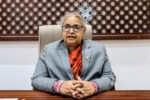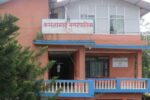ISTANBUL: The prospect of rescuing more people in Turkey and Syria — trapped under rubble four days after 7.8 and 7.5 magnitude earthquakes — was fading Friday, but several survivors were pulled from the ruins in Hatay province in Turkey’s south, including a woman and her 6-month-old daughter.
Officials said the death toll from the powerful earthquakes that struck along the Turkey-Syria border Monday had passed 22,000, making it the world’s deadliest seismic event since a 2011 earthquake and tsunami that killed nearly 20,000 people in Japan.
Turkish President Recep Tayyip Erdogan declared seven days of national mourning and a three-month state of emergency in the 10 provinces directly affected by the quake.
In Syria, President Bashar al-Assad and his wife made their first visit to quake victims at a hospital in the government-controlled city of Aleppo, which suffered extensive damage from years of bombardment during the country’s civil war.
Assad appeared on television chairing emergency meetings on the quakes but has neither addressed the country nor held a news conference about the disaster.
In a move that could help speed up assistance to survivors, Syrian state media reported Friday that the government had approved the delivery of humanitarian aid to all parts of the country, including opposition-held areas in the northwest.
Massive rescue effort
More than four days after the powerful quakes, hope of finding survivors was diminishing.
Turkey’s disaster management agency said Thursday that about 110,000 personnel were involved in rescue efforts and 5,500 vehicles, such as tractors, cranes, bulldozers and excavators, had been shipped to assist the operations.
Erdogan has visited the area near the 7.8 magnitude quake’s epicenter, close to the city of Gaziantep and the Turkey-Syria border.
He acknowledged the survivors’ frustration and the problems with the disaster response.
“It is not possible to be prepared for such a disaster,” Erdogan said. “We will not leave any of our citizens uncared for.” He pointed to the winter weather and the earthquakes’ destruction of the runway at Hatay’s airport as being among the obstacles that have hampered the response.
On Friday, a frantic mother in the Mediterranean city of Kahramanmaras told VOA Turkish that she had been waiting four days for a team to help locate her four missing children.
“Since yesterday, we have been calling their names out, but no response,” Ilkay Balt said of her children Onur Ali, Tayfun, Şaziye, and 18-month-old Eylul. “I am asking to those going from here, those soldiers here, please look for them. They say it is not a task we can do. Why isn’t there a crew here then?”
Search sites also have been the scene of some celebrations as people are found alive.
In Gaziantep, The Associated Press reported Adnan Muhammed Korkut, 17, was pulled from the rubble of a basement. He had been trapped for 94 hours, forced to drink his own urine to survive.
“Thank God you arrived,” he said, embracing his mother and others who leaned down to kiss and hug him as he was being loaded into an ambulance.
The Swiss ambassador to the United Nations told reporters that his nation’s rescue teams, who joined the effort Monday, had rescued a mother and her 6-month-old baby Friday in Hatay province.
“A glimpse of hope,” Ambassador Pascale Baeriswyl told reporters.
Devastation
The success stories were overshadowed by the overwhelming number of dead. The region’s morgues and cemeteries were struggling to cope, and bodies lay wrapped in blankets, rugs and tarps in the streets of some cities.
The destruction was unimaginable.
“I have never seen such an earthquake in the world. The city is destroyed,” survivor Yusuf Demir told VOA Turkish in the southeastern city of Adiyaman. “There is no such place that can be called a city. Adiyaman is now a place that has been erased from the map.”
Dozens of rescue teams were searching for survivors. Some voices heard within the rubble fell silent.
“We could hear their voices. They were calling for help,” said Ali Silo, whose two relatives could not be saved in the Turkish town of Nurdagi.
More than 8,000 people have been pulled from the debris in Turkey, Vice President Fuat Oktay said, and about 380,000 have taken refuge in government shelters or hotels. They huddled in shopping malls, stadiums, mosques and community centers, while others spent the night outside wrapped in blankets, gathering around fires.
The earthquakes struck a region affected on both sides of the border by more than a decade of civil war in Syria.
On the Syrian side, the impact zone was divided between government-held territory and the country’s last opposition-held enclave, which was surrounded by Russian-backed government forces. The U.N. refugee agency estimated that as many as 5.3 million people had been left homeless in Syria. Turkey, meanwhile, is home to millions of refugees from the conflict, many living near the epicenter.
Humanitarian response
U.N. humanitarian chief Martin Griffiths was in the Turkish capital, Ankara, on Friday. He met with the head of the national disaster agency, Governor Yunus Sezer, and other senior officials.
A U.N. Disaster Assessment and Coordination team was embedded in the Turkish disaster management operations center so there could be better coordination.
Griffiths was to go to Aleppo and Damascus in Syria to continue evaluating needs and the U.N. response.
His office announced Friday that an additional $25 million for earthquake relief efforts in Syria would come from the organization’s central emergency relief fund. That’s in addition to the $25 million he released Tuesday from the same account.
In a welcome development, Syrian state media reported Friday that the government had approved the delivery of humanitarian aid to all parts of the country, including opposition-held areas in the northwest.
Delivery of humanitarian aid in Syria is complicated, as the government tries to limit what goes to areas outside its control.
On Friday, the U.N. said a second aid convoy, made up of 14 trucks from the International Organization for Migration, crossed the Bab al-Hawa border crossing from Turkey into northwest Syria with shelter and non-food items. The first convoy of a half dozen trucks arrived Thursday. The road from the aid hub in Gaziantep to Bab al-Hawa was damaged in the quakes and was temporarily closed.
The World Food Program has so far delivered food aid to 115,000 people in Turkey and Syria since the earthquakes struck. The World Health Organization sent urgently needed medical supplies to Turkey on Thursday, and a second plane was due in Syria on Friday with 35 metric tons of supplies.
The United Nations is authorized by its Security Council to use only a single border crossing — Bab al-Hawa — to move humanitarian supplies from Turkey into areas outside Syrian government control in the country’s north.
U.N. Secretary-General Antonio Guterres has called for more access and told reporters Thursday that he would be “very happy” if the Security Council could agree to allow more crossing points to be used.
Griffiths will brief the council next week, and it will work from his assessment of what is needed, the two ambassadors who are responsible for the Syria humanitarian file on the council told reporters Friday.
Before the earthquakes, there were 15.3 million Syrians in need of humanitarian assistance because of the war and an economic crisis. The U.N. said that the quakes impacted 10.9 million Syrians.
The Pentagon said Friday that the U.S. European Command had positioned military capabilities, personnel and equipment to assist the Turkish government in its search-and-rescue efforts. One team arrived Thursday at Incirlik Air Base in southern Turkey at Ankara’s request, to assess how the U.S. military could rapidly respond with critically needed capabilities and equipment.
VOA









Comment